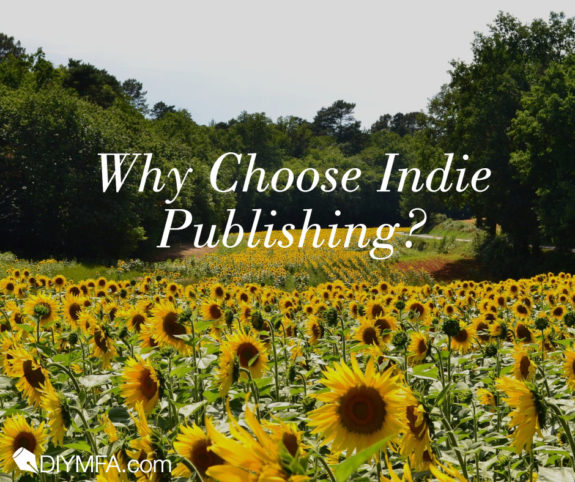A decade ago, most people perceived independent publishing (also called self-publishing) as a last option, something that was not so much chosen by the author as for him (i.e., no one wanted his work). But today a growing number of authors, including those who’ve been traditionally published, choose to publish independently for a part or all of their writing.
In independent publishing, the author acts as the head of a small publishing company, making decisions about a book’s content, title, and cover and interior design. Often, they hire creative professionals to provide key services like developmental or copy editing, cover design, or audiobook narration. (The term independent publishing acknowledges the contributions of these important members of the publishing team.) The author-publisher also sets the book’s budget, plans the book’s marketing, promotion and pricing, determines the formats in which the work will be offered (hardback, paperback, e-book, audio, etc.) and the channels in which those formats will be distributed, and creates a business strategy to ensure their work garners as much success as possible.
If that sounds like a lot of work, it is. But it’s also incredibly satisfying.
Why should an author choose independent publishing?
1) There’s virtually no barrier to entry. That empowers authors to use their time strategically.
Here’s a dose of reality: If your dream is to be published by one of the Big Five publishers, you’ll need an agent. Finding an editor who’ll consider an unrepresented manuscript is harder than finding a Yeti riding a unicorn. And finding an agent….well, frankly, that can be just as challenging. To give yourself the best chance, you’ll have to research agents who represent work like yours, tailor your pitch—which you’ve already spent hours perfecting—specifically to that agent, send it off with fingers crossed, and start the process of monitoring your queries.
Agents get thousands of queries a day. Authors have about fifteen seconds to entice an agent to ask for pages. Even if you’ve done a masterful job of refining your pitch and you’ve targeted your potential agent carefully, your pitch may land in her inbox just as she’s come off a terrible conference call. Or perhaps she’s read three dozen lousy pitches already and she’s crabby, or he just spilled coffee all over his keyboard. Your otherwise-perfect pitch may get passed over due to bad timing or rotten luck.
All these factors mean finding an agent can become a part-time job in itself, frequently taking eighteen months or longer of diligent querying to find a match. By going indie, you can spend that same amount of time working on your manuscript (or two, or more) in partnership with an editor of your choosing, practicing your craft, and developing your platform and your business savvy.
Even if you end up with that longed-for traditional deal, you’ll need strong business and marketing skills to make your book a success. Because here’s a dirty little secret: Unless your last name is Kardashian, you’re going to have to market your book. And if you’re a Kardashian, you’re marketing everything about yourself anyway, so what’s a book thrown into the bargain?
2) You can write what you want
One challenge in navigating the traditional publishing channels is that you’ve got to convince an agent, and then an editor, that there’s a market for your work. But what if you like to read and want to write Amish time-travel mysteries? Or sports romance? Or military space operas? There are successful indie authors you’ve probably never heard of who have quit their day jobs to write in these genres. Independent publishing allowed them to find and serve an audience that a traditional publisher would never have taken a risk on, and they continue to be handsomely rewarded by their readers.
3) The independent publishing community is supportive
Indie authors are, by and large, a generous and collegial lot, eager to share strategies that have worked for them and to encourage new authors to persevere. In an environment where nobody is competing for scarce publisher resources, an attitude of good karma prevails. But wait, you say, aren’t you competing for readers? Let me tell you, there are readers out there who consume a book a day. None of us can produce work on that kind of schedule. Indie authors work together to keep those readers happy. There’s plenty of readership to go around.
4) You can develop a platform to leverage a traditional deal
Still want that traditional deal but having trouble finding an agent? You’ll get more attention if you can bring a platform of potential readers with you. Particularly if you write genre fiction (mysteries, thrillers, romance, sci-fi, or fantasy), you can write a series, develop a following, and leverage that following to attract the attention of an agent.
Along the way, you’ll not only develop discipline and understand your own writing process, but you’ll come to understand the publishing cycle. You’ll develop a better sense for what your readers like, where your strengths and weaknesses lie, and what sells and what doesn’t. All of that knowledge will make you a better client and professional colleague to your eventual agent and editor.
5) You can actually make a living from your writing
Traditional publishing royalties, while varying by publisher, generally fall between 8-15%. Sometimes that’s based on the list price (the price printed on the book) and sometimes it’s based on net receipts (the amount the publisher actually gets for the book, which is often much less). By contrast, Amazon, Kobo, and other vendors pay authors royalties of 70% of list price for books priced over $2.99, and 35% for books priced $0.99 to $2.99. (Why would an independent author price his or her book at $0.99? I’ll address that in a future post.) For a more detailed explanation of traditional publishing’s royalty system, Jane Friedman’s book The Business of Being a Writer goes into useful detail on this topic.
As an independent author, you control the pricing of your work at all times. If you try a price and if sales aren’t what you’d like, you can run a promotion—almost instantly—to get your book in front of more readers. You can tinker with it endlessly until you find the sweet spot that makes your book fly off the digital shelves.
You can also control the pricing of your print book, if you choose print-on-demand options. While the royalty isn’t quite as generous on the print side, it’s still leaps and bounds ahead of the traditional offering. I earn between 20-35% on my print paperbacks, depending on the channel distributing the book.
The cash flow is better, too. With independent publishing, you’re paid monthly. Most traditional publishers pay twice a year or quarterly…assuming you’ve earned out your advance.
Whether they admit it or not, most writers who dare to put pen to paper aspire to make a living off their writing. Independent publishing allows authors to do that, and it’s not just theoretical. Scores of independent authors have quit their day jobs to write full-time, or have used their writing income to pay off debts, put their kids through college, or augment their retirement savings. In future posts, we’ll meet some of them. They may not be household names, but they’re living their writing dreams. If you’re willing to work hard, you can too.
6) It’s incredibly satisfying
Being the publisher of your own work is empowering. Seeing the fruits of your creative labor flourish as a result of your own strategic decisions is arguably as validating, if not more so, than any contract offered by a major publisher.
Independent publishing isn’t for everyone. It is an entrepreneurial act and requires a certain mindset to be successful: one willing to look critically at his or her writing, to assess her strengths and weaknesses, to take calculated business risks, and to be willing to fail and to learn from mistakes. But whether it represents the entirety of the author’s portfolio of work or a small part, independent publishing can contribute in strategic and meaningful ways to advancing an author’s career. I’m looking forward to exploring this exciting and rapidly changing world with you.
 Helen J. Darling writes contemporary women’s fiction. Her first novel, I’ll Know Me When I Find Me, was self-published in January 2018. You can connect with her at itshelendarling.com.
Helen J. Darling writes contemporary women’s fiction. Her first novel, I’ll Know Me When I Find Me, was self-published in January 2018. You can connect with her at itshelendarling.com.







